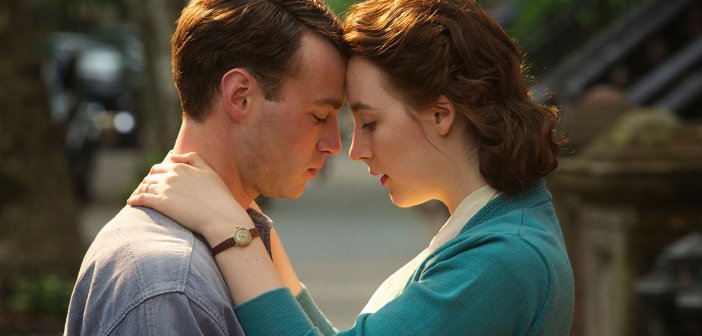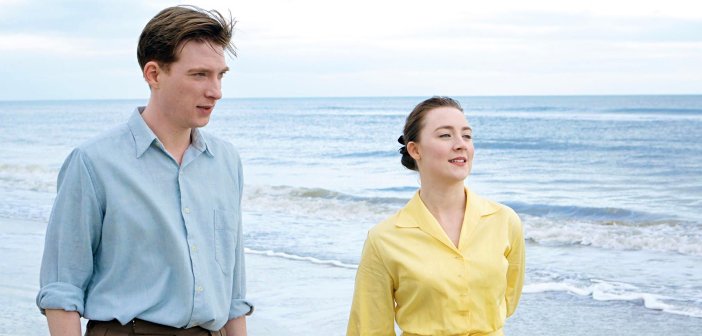Oscar Watch | Why Brooklyn Should Win Best Picture
Alec Baldwin recently revealed that he threw his can of Coca Cola at his television screen the night Sean Penn won the Best Actor for his eponymous performance as Harvey Milk, when Mickey Rourke so desperately deserved the award over him. Baldwin argues that while Penn gave a perfectly good turn as Milk, it was the weight of the real person that ensured Oscar victory over Rourke’s superior performance as Randy ‘The Ram’ Robinson in Darren Aronofsky’s The Wrestler. This exact same thing happened last year with Michael Keaton’s mesmerising ‘Birdman’ performance left in the lurch in favour of Eddie “Who?” Redmayne’s meat and potatoes impression of Stephen Hawking. Year after year, the films that win Academy Awards are the films that are important and serious and deal with topical social issues rather than any kind of transformative cinema. It’s a pet peeve of mine and is one of the contributing factors for why I rarely bother to stay up and watch the actual broadcast of the tawdry affair, opting instead to watch this and that speech on YouTube the morning after.

It is with a heavy heart that I must make an exception for Brooklyn. I truly hope it wins Best Picture for great big, selfish, emotional, reasons that apply to me and my own sense of patriotic rhetoric, as opposed to any assumption that it’s a better film than its lofty competitors. The film may be called Brooklyn but it is unquestionably a film about Ireland, about our journey from a repressed, sanitised group of automatons to an enlightened force of nature that forged industry, culture and love on every corner of the globe. As a film ‘about Ireland’ it is quite simply the most moving depiction of where we’ve gone that I’ve seen in some time. The film was funded in part by the BFI so we begrudgingly have to allow them to refer to it as a ‘British Film’, but fuck it nonetheless, how dare they? As Rose (the understated Fiona Glascott) watches her broken-hearted sister Eilis (Saoirse Ronan) sail away on a boat of lost souls, as Eilis listens to an old drunkard well up at a soulful rendition of ‘Mo Ghile Mear’, as Jim Farrell (Domhnall Gleeson) wishes he could ever imagine a life where he wouldn’t die in Wexford, Brooklyn establishes itself as the quintessential film of Irish people. They can’t take this one away from us.
The film’s first and most notable asset is without question the mammoth central performance. With the wide-eyed Eilis, Saoirse Ronan has finally found herself the role that will allow her to punch through the troublesome barrier of adolescence and into the realm of a heavy-hitting Hollywood giant. For all the hammy school-play attempts at old broads from the 1950s we’ve seen over the years, I was never less than totally convinced by her performance – her stature, her facial expressions, her tone of voice, even her accent (so often ridiculed in real life) is flawless. Even if Brie Larson does nab the gong, Ronan will be back in years to come and her unfathomable ability to master innocence and wisdom at any one time will ensure eventual victory, not to mention her awesome superpower that somehow allows her total control over the dilation of her pupils. So much of what makes Brooklyn brilliant is down to Saoirse Ronan.
The film’s deals with well-worn Oscar-friendly themes – the hero’s journey being the most recognisable in the opening act. On her rocky flight to freedom, Eilis encounters a sassy Americanised dame who knows how to get what she wants and is willing to show the virginal Eilis the ropes. Julie Walters’ jovial, God-fearing ‘bean an tí’ introduces her to the proper order of life in a boarding house with a gaggle of giggly women. Jim Broadbent’s friendly old Catholic priest finds her a job and gives her a pat on the back when she needs it. Crucially, a handsome young Italian man takes a shine to Eilis and a downright lovely courtship ensues that feels like a cinematic throwback to a time when love stories didn’t need sarcasm or eyebrow-raising. Emory Cohen’s “Golly!” performance as Tony Fiorello is very sweet and displays an admirable amount of dough-eyed vulnerability. All of these characters help pave her journey of discovery. This helps set her on the rocky path to success in her newfound home.

The main conflict in the film is that of Ireland’s (or in this case, Enniscorthy’s) repressive Catholic guilt being at odds with Eilis’ burning sense of newfound freedom (borne of her American independence). When tragedy forces her to return to her hometown, she suddenly realises how much of her life was thrust upon her there – how everyone makes decisions for everyone else, without any question of discussion or any notion of reluctance. Her mother states that Eilis will be present at her best friend’s upcoming nuptials, despite the fact that it clashes with her plans to return to New York, the owner of the local factory demands that Eilis come over at once to fix up the accounts (despite the fact that she’s not employed by them), the cranky auld bitch who works in the grocery shop sends a lackey to bring her to the shop just so she can scold her for her transgressions abroad. Eilis does however discover a beauty about the place that perhaps she didn’t notice before she left for the New World – compared to the sprawling masses of Coney Island on a sweltering Summer’s day, the endearing crapness of breezy Curracloe is a sight to behold. With a touching tribute to Eilis’ lost family member, Domhnall Gleeson’s Jim Farrell reminds her that as much as she would love to pretend like Ireland was all doldrums and archaic customs, it still has a soul and a place for her. In one of the most heartbreaking moments of the film (ruined by the trailer, of course), he insists to her that her life in Ireland could be just as good as in America. “Better even.” For the first time, her decision seems like it might be a difficult one. Ultimately however, Eilis’ final confrontation with that aforementioned repression, the figurative ‘dragon’ of Enniscorthy is what causes her to finally let that part of her life go and embrace a world of her own, a destiny she hasn’t been bludgeoned into accepting with a love that is ‘only hers’. People can say that that’s schmaltzy, but a hundred years after the rising, I found it bloody powerful and quite a bit lovely.
Look, I’m not going to pretend like it has a chance against Room. Structurally, the film is quite simplistic, technically it is unremarkable and the plot certainly isn’t the most original; certainly not among the other films nominated for awards this year. While it certainly doesn’t look bad, there are times where the film’s low-budget production design makes it look as though it could be an ITV film of the week (not surprising so, to learn that the BBC are planning a TV spinoff). What elevates the film (in addition to Ronan’s shockingly good performance) is its staggering emotional heft and cultural relevance – the way Eilis grows over the course of the film is the way we grew as a nation. It’s almost a shame that the film was released in Oscar season at all – must it be ranked against the merits of other excellent films? Wherever it falls in the record books, it’s nonetheless a powerful exploration of the evolution of the Irish psyche and a love letter to the trials and tribulations so many of us faced. Crucially though, like so many Oscar movies before it, it’s simply a love story and a grand one at that.
Featured Image Credit

